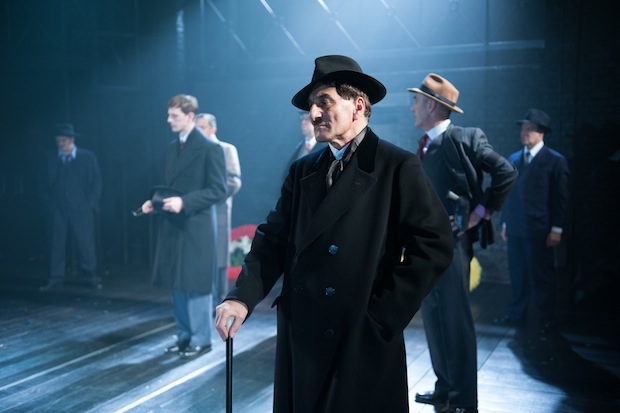Brecht in the West End? Quite a rarity. Jonathan Church’s zippy and stylish version of The Resistible Rise of Arturo Ui arrives from the Chichester Festival garlanded with plaudits. Brecht’s wartime allegory was intended as a warning to America that its idolisation of gangsters made it vulnerable to a fascist takeover. Ui begins as a petty criminal mocked by Chicago’s established hoodlums. To revive his fortunes, he orders his thugs to vandalise grocery shops and to extract protection money from their owners. This brings him into conflict with Chicago’s mighty Cauliflower Trust. A huge warehouse belonging to a leading merchant is burned to the ground and Ui orchestrates a show trial that enables him to abolish the civil authority and seize control of the city. He then annexes the neighbouring town of Cicero.
The parallels with events in the 1930s, notably the Reichstag fire and the Anschluss, are hammered home with little subtlety here. Brecht was writing in a hurry and his blast of propaganda hasn’t the finesse or the haunting political lyricism of, say, Animal Farm. And because the play was completed in 1941, when Hitler was the 20th century’s Napoleon but not yet its Angel of Death, the story is unfinished. Brecht seems to keep missing things: there’s no Chamberlain or Mussolini, no League of Nations, no Holocaust. And he offers no solution to the problems posed in his title. Can Ui be resisted? If so, how? We know the answers. Brecht, of course, does not and this gulf of understanding mars the show as a piece of dramatic entertainment. In the final half-hour Brecht overindulges himself and experiments with Shakespearean rip-offs by placing Ui in scenes plagiarised explicitly from Richard III and Julius Caesar. This is the great peril with Brecht: he will always be Brecht.
The production has ample compensations. Simon Higlett’s costumes are crisp and beautiful, and his design has potency and elegance. The theatre has been reconfigured with a sinister runway down the central aisle, which lends the auditorium a gentle hint of Nuremberg. The show’s outstanding presence is Henry Goodman as Ui. There’s no shortage of Hitler impersonators in our comic culture: Charlie Chaplin, Basil Fawlty, Freddie Starr and even Blakey from On the Buses all had fun mocking the demented tyrant. Goodman cleverly distances himself this heritage and creates a fresh and convincing portrait of paranoid megalomania. Ui starts as a sweating, hunchbacked coward and later emerges as a sleek and powerful manipulator of the masses. The point of transition is the play’s highlight and it comes early in Act I. In need of rhetorical training, Ui engages a jobless thespian to teach him the rudiments of poise, gesture, phrasing, movement and enunciation. Together they study Mark Antony’s speech over Caesar’s corpse and the scene becomes a comic tour de force as Goodman, aided by his straight man, Keith Baxter, delivers a ten-minute clowning routine, which is Mr Bean-like in its sweetness, simplicity and acrobatic brilliance. It doesn’t have much to do with Hitler, or with Brecht, come to that, but it’s one of the funniest sketches I’ve ever seen.
The Arts Theatre has a small gem of a play by Anton Burge about Constance Spry. Storm in a Flower Vase relates how an obscure upper-class nurse became Britain’s leading floral decorator. Spry opened her first shop, Flower Decoration, in Mayfair in 1929 and it rapidly expanded into a thriving business. Her romantic life, which the play focuses on, was unusually complicated. She had a long-standing affair with her mentor, Shav, who was meticulous about the couple’s social status and insisted that Spry use the title ‘flower decorator’ not ‘florist’. ‘Floristry is a trade,’ he sniffed. At the same time Shav dallied freely with one of Spry’s assistants. Jealousy and despair drove Spry into the arms of Hannah Gluckstein, a lesbian painter, who truncated her name to the severe monosyllable ‘Gluck’. The story of their tangled and doomed affair is told here with great warmth and feeling.
The play seems astonishingly up to date because Spry set out to demystify her profession and to welcome all-comers. Anyone could master the required skills, she said, provided they approached flowers in a spirit of self-confident improvisation. She was a punk florist. Her particular joy was to place garden blooms alongside weeds, wildflowers and even kale. This had never been done before. In her public lessons she demonstrated flower arranging using the sort of old sweetie jar anyone could find in a cupboard. And she wrapped the stems in a rat’s tail of greasy string. Had she lived today, television would have been her natural medium. She died in 1960 after tripping on the stairs at home. Her last words were: ‘Someone else can arrange this.’








Comments